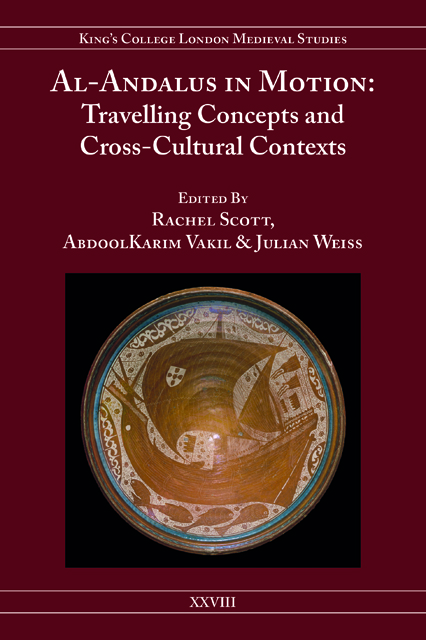Book contents
- Frontmatter
- Contents
- List of Illustrations
- Acknowledgements
- Notes on Contributors
- Part I Departure Points
- Part II Translating Al-Andalus: Travelling across Languages
- Part III (Re)Visions of Al-Andalus in Diaspora and Exile
- Part IV Andalusi Space as Node and Utopia: Europe, Islam, Empire
- Part V Al-Andalus and the Politics of Religious Identity
- Part VI Legacies, Landscapes and ‘Travel Buildings’
- Epilogue
- Index
11 - The Forgotten ‘Orient’: Travel Writing in Portugal, c. 1930–49
Published online by Cambridge University Press: 02 June 2023
- Frontmatter
- Contents
- List of Illustrations
- Acknowledgements
- Notes on Contributors
- Part I Departure Points
- Part II Translating Al-Andalus: Travelling across Languages
- Part III (Re)Visions of Al-Andalus in Diaspora and Exile
- Part IV Andalusi Space as Node and Utopia: Europe, Islam, Empire
- Part V Al-Andalus and the Politics of Religious Identity
- Part VI Legacies, Landscapes and ‘Travel Buildings’
- Epilogue
- Index
Summary
Although Portugal shares in the Iberian Peninsula's history of a medieval Islamic cultural presence, it is far less likely than Spain is to be associated with the Orient in the European consciousness. Bearing in mind the distinction made by Edward Said in his Orientalism between the ‘real’ and the Orient as imagined in textual representations (2003: 5), Lou Charnon-Deutsch, amongst others, has argued that Romantic travel writing was of central importance in constructing this imagined Orient in Spain (Charnon-Deutsch 2004: 48–51, 180). But whereas nineteenth-century travel writing on Spain was culturally influential in this sense, the same did not occur with travel writing on Portugal. In fact, as I have elsewhere shown (Gryspeerdt 2020), in travel writing from the late eighteenth and nineteenth centuries, a Portuguese medieval Orient was only fleetingly perceived. The smaller scale of the architectural remains, as well as the lack of available historical information about Muslim figures or Islamic culture at the Portuguese sites visited, encouraged a muted response. Moorish castles would be mentioned briefly by early travellers, but their enthusiasm was reserved both for Portugal's Christian Gothic architecture and its more recent eclectic Orientalist palaces, which had no real connection with the architectural traditions of Gharb al-Andalus (in the Portuguese context, the part of al-Andalus corresponding to modern-day southern Portugal, including the Algarve). There are exceptions, such as the French writer Olivier Merson, who writes engagingly on the persistence of traces of the Orient in the behaviour of the Portuguese (1857: 73–75). However, although some travellers had the tantalising sense that Portuguese history must surely hold fascinating secrets, they generally did not produce the extended imaginative pieces on al-Andalus that filled the pages of French Romantic travel accounts on Toledo, Seville, Granada and Cordoba.
In contrast, British travel writing on Portugal from the 1930s offers a wide-ranging acknowledgment of the Islamic cultural legacy in Portugal in its various forms. As I shall argue, such travel writing appears to have ‘caught up’ in many ways with nineteenth-century travel writing on Spain, revealing both an extension of the perceived Iberian Orient to encompass southern Portugal, and the difficulty of avoiding the influence of earlier travel writing on Spain and its associated tropes.
- Type
- Chapter
- Information
- Al-Andalus in MotionTravelling Concepts and Cross-Cultural Contexts, pp. 289 - 310Publisher: Boydell & BrewerPrint publication year: 2021



